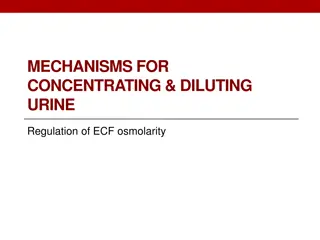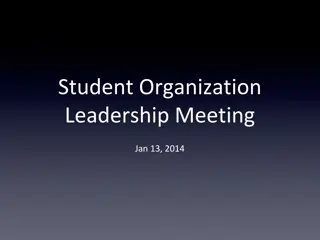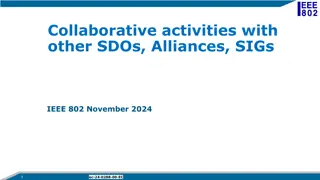
Understanding Child Processes and Zombie States in Computer Systems
Dive into the world of child processes and zombie states within computer systems. Learn how parent processes manage terminated child processes and the concept of reaping to avoid system resource consumption. Explore examples and the synchronization process with children using the wait function.
Uploaded on | 0 Views
Download Presentation

Please find below an Image/Link to download the presentation.
The content on the website is provided AS IS for your information and personal use only. It may not be sold, licensed, or shared on other websites without obtaining consent from the author. If you encounter any issues during the download, it is possible that the publisher has removed the file from their server.
You are allowed to download the files provided on this website for personal or commercial use, subject to the condition that they are used lawfully. All files are the property of their respective owners.
The content on the website is provided AS IS for your information and personal use only. It may not be sold, licensed, or shared on other websites without obtaining consent from the author.
E N D
Presentation Transcript
Carnegie Mellon 14-513 18 18- -613 613 1 Bryant and O Hallaron, Computer Systems: A Programmer s Perspective, Third Edition
Carnegie Mellon Exceptional Control Flow: Signals 18-213/18-613: Introduction to Computer Systems 18th Lecture, November 3, 2022 2 Bryant and O Hallaron, Computer Systems: A Programmer s Perspective, Third Edition
Carnegie Mellon Announcements Homework #8 due Today (Nov 3) Malloc Final due Monday (Nov 7) Shell lab out Monday (Nov 7) Homework #9 due Thursday (Nov 10) 3 Bryant and O Hallaron, Computer Systems: A Programmer s Perspective, Third Edition
Carnegie Mellon Reaping Child Processes Idea When process terminates, it still consumes system resources Examples: Exit status, various OS tables Called a zombie Living corpse, half alive and half dead Reaping Performed by parent on terminated child (using wait or waitpid) Parent is given exit status information Kernel then deletes zombie child process What if parent doesn t reap? If any parent terminates without reaping a child, then the orphaned child should be reaped by init process (pid == 1) Unless ppid == 1! Then need to reboot So, only need explicit reaping in long-running processes e.g., shells and servers 4 Bryant and O Hallaron, Computer Systems: A Programmer s Perspective, Third Edition
Carnegie Mellon void fork7() { if (fork() == 0) { /* Child */ printf("Terminating Child, PID = %d\n", getpid()); exit(0); } else { printf("Running Parent, PID = %d\n", getpid()); while (1) ; /* Infinite loop */ } } Zombie Example linux> ./forks 7 & [1] 6639 Running Parent, PID = 6639 Terminating Child, PID = 6640 linux> ps PID TTY TIME CMD 6585 ttyp9 00:00:00 tcsh 6639 ttyp9 00:00:03 forks 6640 ttyp9 00:00:00 forks <defunct> 6641 ttyp9 00:00:00 ps 6641 ttyp9 00:00:00 ps linux> kill 6639 [1] Terminated linux> ps PID TTY TIME CMD 6585 ttyp9 00:00:00 tcsh 6642 ttyp9 00:00:00 ps linux> ./forks 7 & [1] 6639 Running Parent, PID = 6639 Terminating Child, PID = 6640 Terminating Child, PID = 6640 linux> ps PID TTY TIME CMD 6585 ttyp9 00:00:00 tcsh 6639 ttyp9 00:00:03 forks 6640 ttyp9 00:00:00 forks <defunct> linux> ./forks 7 & [1] 6639 Running Parent, PID = 6639 forks.c ps shows child process as defunct (i.e., a zombie) Killing parent allows child to be reaped by init 5 Bryant and O Hallaron, Computer Systems: A Programmer s Perspective, Third Edition
Carnegie Mellon wait: Synchronizing with Children Parent reaps a child by calling the wait function int wait(int *child_status) Suspends current process until one of its children terminates Implemented as syscall Parent Process Kernel code Exception And, potentially other user processes, including a child of parent syscall Returns 7 Bryant and O Hallaron, Computer Systems: A Programmer s Perspective, Third Edition
Carnegie Mellon wait: Synchronizing with Children Parent reaps a child by calling the wait function int wait(int *child_status) Suspends current process until one of its children terminates Return value is the pid of the child process that terminated If child_status!= NULL, then the integer it points to will be set to a value that indicates reason the child terminated and the exit status: Checked using macros defined in wait.h WIFEXITED, WEXITSTATUS, WIFSIGNALED, WTERMSIG, WIFSTOPPED, WSTOPSIG, WIFCONTINUED See textbook for details 8 Bryant and O Hallaron, Computer Systems: A Programmer s Perspective, Third Edition
Carnegie Mellon wait: Synchronizing with Children void fork9() { int child_status; HC exit if (fork() == 0) { printf("HC: hello from child\n"); exit(0); } else { printf("HP: hello from parent\n"); wait(&child_status); printf("CT: child has terminated\n"); } printf("Bye\n"); } printf CT Bye HP printf wait printf fork forks.c Feasible output: HC HP CT Bye Bye Feasible output(s): HC HP CT Infeasible output: HP CT Bye HC HP HC CT Bye 9 Bryant and O Hallaron, Computer Systems: A Programmer s Perspective, Third Edition
Carnegie Mellon Another wait Example If multiple children completed, will take in arbitrary order Can use macros WIFEXITED and WEXITSTATUS to get information about exit status void fork10() { pid_t pid[N]; int i, child_status; for (i = 0; i < N; i++) if ((pid[i] = fork()) == 0) { exit(100+i); /* Child */ } for (i = 0; i < N; i++) { /* Parent */ pid_t wpid = wait(&child_status); if (WIFEXITED(child_status)) printf("Child %d terminated with exit status %d\n", wpid, WEXITSTATUS(child_status)); else printf("Child %d terminate abnormally\n", wpid); } } forks.c 10 Bryant and O Hallaron, Computer Systems: A Programmer s Perspective, Third Edition
Carnegie Mellon waitpid: Waiting for a Specific Process pid_t waitpid(pid_t pid, int *status, int options) Suspends current process until specific process terminates Various options (see textbook) void fork11() { pid_t pid[N]; int i; int child_status; waitpid(-1, &child_status, 0) is equivalent to wait(&child_status); for (i = 0; i < N; i++) if ((pid[i] = fork()) == 0) exit(100+i); /* Child */ for (i = N-1; i >= 0; i--) { pid_t wpid = waitpid(pid[i], &child_status, 0); if (WIFEXITED(child_status)) printf("Child %d terminated with exit status %d\n", wpid, WEXITSTATUS(child_status)); else printf("Child %d terminate abnormally\n", wpid); } } forks.c 11 Bryant and O Hallaron, Computer Systems: A Programmer s Perspective, Third Edition
Carnegie Mellon execve: Loading and Running Programs int execve(char *filename, char *argv[], char *envp[]) Loads and runs in the current process: Executable file filename Can be object file or script file beginning with #!interpreter (e.g., #!/bin/bash) with argument list argv By convention argv[0]==filename and environment variable list envp name=value strings (e.g., USER=droh) getenv, putenv, printenv Overwrites code, data, and stack Retains PID, open files and signal context Called once and never returns except if there is an error 12 Bryant and O Hallaron, Computer Systems: A Programmer s Perspective, Third Edition
Carnegie Mellon execve Example Execute "/bin/ls lt /usr/include" in child process using current environment: envp[n] = NULL envp[n-1] "PWD=/usr/droh" envp[0] "USER=droh" environ myargv[argc] = NULL myargv[2] myargv[1] "/usr/include" (argc == 3) "-lt" myargv[0] myargv "/bin/ls" if ((pid = Fork()) == 0) { /* Child runs program */ if (execve(myargv[0], myargv, environ) < 0) { printf("%s: Command not found.\n", myargv[0]); exit(1); } } 13 Bryant and O Hallaron, Computer Systems: A Programmer s Perspective, Third Edition
Carnegie Mellon Bottom of stack Null-terminated environment variable strings Structure of the stack when a new program starts Null-terminated command-line arg strings envp[n] == NULL envp[n-1] ... envp[0] argv[argc] = NULL argv[argc-1] ... argv[0] environ (global var) envp (in %rdx) argv (in %rsi) Stack frame for libc_start_main argc (in %rdi) Top of stack Future stack frame for main 14 Bryant and O Hallaron, Computer Systems: A Programmer s Perspective, Third Edition
Carnegie Mellon The execve Function Revisited To load and run a new program a.out in the current process using execve: Private, demand-zero User stack libc.so Free vm_area_struct s and page tables for old areas .data .text Memory mapped region for shared libraries Shared, file-backed Create vm_area_struct s and page tables for new areas Programs and initialized data backed by object files. .bss and stack backed by anonymous files. Private, demand-zero Runtime heap (via malloc) Private, demand-zero Uninitialized data (.bss) a.out Initialized data (.data) .data .text Private, file-backed Program text (.text) Set PC to entry point in .text Linux will fault in code and data pages as needed. 0 15 Bryant and O Hallaron, Computer Systems: A Programmer s Perspective, Third Edition
Carnegie Mellon Exceptions & Processes - Summary Exceptions Events that require nonstandard control flow Generated externally (interrupts) or internally (traps and faults) Processes At any given time, system has multiple active processes Only one can execute at a time on any single core Each process appears to have total control of processor + private memory space 16 Bryant and O Hallaron, Computer Systems: A Programmer s Perspective, Third Edition
Carnegie Mellon Today Shells CSAPP 8.4.6 CSAPP 8.5 Signals 17 Bryant and O Hallaron, Computer Systems: A Programmer s Perspective, Third Edition
Carnegie Mellon Linux Process Hierarchy [0] init [1] Daemon e.g. httpd Login shell Login shell Child Child Child Note: you can view the hierarchy using the Linux pstree command Grandchild Grandchild 18 Bryant and O Hallaron, Computer Systems: A Programmer s Perspective, Third Edition
Carnegie Mellon Shell Programs A shell is an application program that runs programs on behalf of the user. sh Original Unix shell (Stephen Bourne, AT&T Bell Labs, 1977) csh/tcsh BSD Unix C shell bash Bourne-Again Shell(default Linux shell) Simple shell Described in the textbook, starting at p. 753 Implementation of a very elementary shell Purpose Understand what happens when you type commands Understand use and operation of process control operations 19 Bryant and O Hallaron, Computer Systems: A Programmer s Perspective, Third Edition
Carnegie Mellon Simple Shell Example linux> ./shellex > /bin/ls -l csapp.c -rw-r--r-- 1 bryant users 23053 Jun 15 2015 csapp.c > /bin/ps PID TTY TIME CMD 31542 pts/2 00:00:01 tcsh 32017 pts/2 00:00:00 shellex 32019 pts/2 00:00:00 ps > /bin/sleep 10 & 32031 /bin/sleep 10 & > /bin/ps PID TTY TIME CMD 31542 pts/2 00:00:01 tcsh 32024 pts/2 00:00:00 emacs 32030 pts/2 00:00:00 shellex 32031 pts/2 00:00:00 sleep 32033 pts/2 00:00:00 ps > quit Note: Must give full pathnames for programs Run program in background Sleep is running in background 20 Bryant and O Hallaron, Computer Systems: A Programmer s Perspective, Third Edition
Carnegie Mellon Simple Shell Implementation Basic loop Read line from command line Execute the requested operation Built-in command (only one implemented is quit) Load and execute program from file int main(int argc, char** argv) { char cmdline[MAXLINE]; /* command line */ Execution is a sequence of read/evaluate steps while (1) { /* read */ printf("> "); Fgets(cmdline, MAXLINE, stdin); if (feof(stdin)) exit(0); /* evaluate */ eval(cmdline); } ... shellex.c 21 Bryant and O Hallaron, Computer Systems: A Programmer s Perspective, Third Edition
Carnegie Mellon Simple Shell eval Function void eval(char *cmdline) { char *argv[MAXARGS]; /* Argument list execve() */ char buf[MAXLINE]; /* Holds modified command line */ int bg; /* Should the job run in bg or fg? */ pid_t pid; /* Process id */ strcpy(buf, cmdline); bg = parseline(buf, argv); if (argv[0] == NULL) return; /* Ignore empty lines */ parselinewill parse buf into argv and return whether or not input line ended in & if (!builtin_command(argv)) { if ((pid = Fork()) == 0) { /* Child runs user job */ if (execve(argv[0], argv, environ) < 0) { printf("%s: Command not found.\n", argv[0]); exit(0); } } /* Parent waits for foreground job to terminate */ if (!bg) { int status; if (waitpid(pid, &status, 0) < 0) unix_error("waitfg: waitpid error"); } else printf("%d %s", pid, cmdline); } return; } shellex.c shellex.c 22 Bryant and O Hallaron, Computer Systems: A Programmer s Perspective, Third Edition
Carnegie Mellon Simple Shell eval Function void eval(char *cmdline) { char *argv[MAXARGS]; /* Argument list execve() */ char buf[MAXLINE]; /* Holds modified command line */ int bg; /* Should the job run in bg or fg? */ pid_t pid; /* Process id */ strcpy(buf, cmdline); bg = parseline(buf, argv); if (argv[0] == NULL) return; /* Ignore empty lines */ Ignore empty lines. if (!builtin_command(argv)) { if ((pid = Fork()) == 0) { /* Child runs user job */ if (execve(argv[0], argv, environ) < 0) { printf("%s: Command not found.\n", argv[0]); exit(0); } } /* Parent waits for foreground job to terminate */ if (!bg) { int status; if (waitpid(pid, &status, 0) < 0) unix_error("waitfg: waitpid error"); } else printf("%d %s", pid, cmdline); } return; } shellex.c shellex.c 23 Bryant and O Hallaron, Computer Systems: A Programmer s Perspective, Third Edition
Carnegie Mellon Simple Shell eval Function void eval(char *cmdline) { char *argv[MAXARGS]; /* Argument list execve() */ char buf[MAXLINE]; /* Holds modified command line */ int bg; /* Should the job run in bg or fg? */ pid_t pid; /* Process id */ strcpy(buf, cmdline); bg = parseline(buf, argv); if (argv[0] == NULL) return; /* Ignore empty lines */ if (!builtin_command(argv)) { if ((pid = Fork()) == 0) { /* Child runs user job */ if (execve(argv[0], argv, environ) < 0) { printf("%s: Command not found.\n", argv[0]); exit(0); } } If it is a built in command, then handle it here in this program. Otherwise fork/exec the program specified in argv[0] /* Parent waits for foreground job to terminate */ if (!bg) { int status; if (waitpid(pid, &status, 0) < 0) unix_error("waitfg: waitpid error"); } else printf("%d %s", pid, cmdline); } return; } shellex.c shellex.c 24 Bryant and O Hallaron, Computer Systems: A Programmer s Perspective, Third Edition
Carnegie Mellon Simple Shell eval Function void eval(char *cmdline) { char *argv[MAXARGS]; /* Argument list execve() */ char buf[MAXLINE]; /* Holds modified command line */ int bg; /* Should the job run in bg or fg? */ pid_t pid; /* Process id */ strcpy(buf, cmdline); bg = parseline(buf, argv); if (argv[0] == NULL) return; /* Ignore empty lines */ if (!builtin_command(argv)) { if ((pid = Fork()) == 0) { /* Child runs user job */ if (execve(argv[0], argv, environ) < 0) { printf("%s: Command not found.\n", argv[0]); exit(0); } } Create child /* Parent waits for foreground job to terminate */ if (!bg) { int status; if (waitpid(pid, &status, 0) < 0) unix_error("waitfg: waitpid error"); } else printf("%d %s", pid, cmdline); } return; } shellex.c shellex.c 25 Bryant and O Hallaron, Computer Systems: A Programmer s Perspective, Third Edition
Carnegie Mellon Simple Shell eval Function void eval(char *cmdline) { char *argv[MAXARGS]; /* Argument list execve() */ char buf[MAXLINE]; /* Holds modified command line */ int bg; /* Should the job run in bg or fg? */ pid_t pid; /* Process id */ strcpy(buf, cmdline); bg = parseline(buf, argv); if (argv[0] == NULL) return; /* Ignore empty lines */ if (!builtin_command(argv)) { if ((pid = Fork()) == 0) { /* Child runs user job */ if (execve(argv[0], argv, environ) < 0) { printf("%s: Command not found.\n", argv[0]); exit(0); } } /* Parent waits for foreground job to terminate */ if (!bg) { int status; if (waitpid(pid, &status, 0) < 0) unix_error("waitfg: waitpid error"); } else printf("%d %s", pid, cmdline); } return; } Start argv[0]. Remember execve only returns on error. shellex.c shellex.c 26 Bryant and O Hallaron, Computer Systems: A Programmer s Perspective, Third Edition
Carnegie Mellon Simple Shell eval Function void eval(char *cmdline) { char *argv[MAXARGS]; /* Argument list execve() */ char buf[MAXLINE]; /* Holds modified command line */ int bg; /* Should the job run in bg or fg? */ pid_t pid; /* Process id */ strcpy(buf, cmdline); bg = parseline(buf, argv); if (argv[0] == NULL) return; /* Ignore empty lines */ if (!builtin_command(argv)) { if ((pid = Fork()) == 0) { /* Child runs user job */ if (execve(argv[0], argv, environ) < 0) { printf("%s: Command not found.\n", argv[0]); exit(0); } } /* Parent waits for foreground job to terminate */ if (!bg) { int status; if (waitpid(pid, &status, 0) < 0) unix_error("waitfg: waitpid error"); } else printf("%d %s", pid, cmdline); } return; } If running child in foreground, wait until it is done. shellex.c shellex.c 27 Bryant and O Hallaron, Computer Systems: A Programmer s Perspective, Third Edition
Carnegie Mellon Simple Shell eval Function void eval(char *cmdline) { char *argv[MAXARGS]; /* Argument list execve() */ char buf[MAXLINE]; /* Holds modified command line */ int bg; /* Should the job run in bg or fg? */ pid_t pid; /* Process id */ strcpy(buf, cmdline); bg = parseline(buf, argv); if (argv[0] == NULL) return; /* Ignore empty lines */ if (!builtin_command(argv)) { if ((pid = Fork()) == 0) { /* Child runs user job */ if (execve(argv[0], argv, environ) < 0) { printf("%s: Command not found.\n", argv[0]); exit(0); } } /* Parent waits for foreground job to terminate */ if (!bg) { int status; if (waitpid(pid, &status, 0) < 0) unix_error("waitfg: waitpid error"); } else{ printf("%d %s", pid, cmdline); } } return; } If running child in background, print pid and continue doing other stuff. shellex.c shellex.c 28 Bryant and O Hallaron, Computer Systems: A Programmer s Perspective, Third Edition
Carnegie Mellon Simple Shell eval Function void eval(char *cmdline) { char *argv[MAXARGS]; /* Argument list execve() */ char buf[MAXLINE]; /* Holds modified command line */ int bg; /* Should the job run in bg or fg? */ pid_t pid; /* Process id */ strcpy(buf, cmdline); bg = parseline(buf, argv); if (argv[0] == NULL) return; /* Ignore empty lines */ if (!builtin_command(argv)) { if ((pid = Fork()) == 0) { /* Child runs user job */ if (execve(argv[0], argv, environ) < 0) { printf("%s: Command not found.\n", argv[0]); exit(0); } } /* Parent waits for foreground job to terminate */ if (!bg) { int status; if (waitpid(pid, &status, 0) < 0) unix_error("waitfg: waitpid error"); } else printf("%d %s", pid, cmdline); } return; } Oops. There is a problem with this code. shellex.c shellex.c 29 Bryant and O Hallaron, Computer Systems: A Programmer s Perspective, Third Edition
Carnegie Mellon Problem with Simple Shell Example Shell designed to run indefinitely Should not accumulate unneeded resources Memory Child processes File descriptors Our example shell correctly waits for and reaps foreground jobs But what about background jobs? Will become zombies when they terminate Will never be reaped because shell (typically) will not terminate Will create a memory leak that could run the kernel out of memory 30 Bryant and O Hallaron, Computer Systems: A Programmer s Perspective, Third Edition
Carnegie Mellon ECF to the Rescue! Solution: Exceptional control flow The kernel will interrupt regular processing to alert us when a background process completes In Unix, the alert mechanism is called a signal 31 Bryant and O Hallaron, Computer Systems: A Programmer s Perspective, Third Edition
Carnegie Mellon Quiz Time! Canvas Quiz: Day 18 ECF Signals 32 Bryant and O Hallaron, Computer Systems: A Programmer s Perspective, Third Edition
Carnegie Mellon Today Shells Signals 33 Bryant and O Hallaron, Computer Systems: A Programmer s Perspective, Third Edition
Carnegie Mellon Handled in kernel (partial) Taxonomy Handled in user process ECF Asynchronous Synchronous Interrupts Traps Faults Aborts Signals 34 Bryant and O Hallaron, Computer Systems: A Programmer s Perspective, Third Edition
Carnegie Mellon Signals A signal is a small message that notifies a process that an event of some type has occurred in the system Akin to exceptions and interrupts Sent from the kernel (sometimes at the request of another process) to a process Signal type is identified by small integer ID s (1-30) Only information in a signal is its ID and the fact that it arrived ID Name Default Action Corresponding Event 2 SIGINT Terminate User typed ctrl-c 9 SIGKILL Terminate Kill program (cannot override or ignore) 11 SIGSEGV Terminate Segmentation violation 14 SIGALRM Terminate Timer signal 17 SIGCHLD Ignore Child stopped or terminated 35 Bryant and O Hallaron, Computer Systems: A Programmer s Perspective, Third Edition
Carnegie Mellon Signal Concepts: Sending a Signal Kernel sends (delivers) a signal to a destination process by updating some state in the context of the destination process Kernel sends a signal for one of the following reasons: Kernel has detected a system event such as divide-by-zero (SIGFPE) or the termination of a child process (SIGCHLD) Another process has invoked the kill system call to explicitly request the kernel to send a signal to the destination process 36 Bryant and O Hallaron, Computer Systems: A Programmer s Perspective, Third Edition
Carnegie Mellon Signal Concepts: Sending a Signal User level Process B Process A Process C kernel Pending for A Pending for B Pending for C Blocked for A Blocked for B Blocked for C 37 Bryant and O Hallaron, Computer Systems: A Programmer s Perspective, Third Edition
Carnegie Mellon Signal Concepts: Sending a Signal User level Process B Process A Process C kernel Pending for A Pending for B Pending for C Blocked for A Blocked for B Blocked for C 38 Bryant and O Hallaron, Computer Systems: A Programmer s Perspective, Third Edition
Carnegie Mellon Signal Concepts: Sending a Signal User level Process B Process A Process C kernel Pending for A Pending for B Pending for C Blocked for A Blocked for B Blocked for C 1 39 Bryant and O Hallaron, Computer Systems: A Programmer s Perspective, Third Edition
Carnegie Mellon Signal Concepts: Sending a Signal User level Process B Process A Process C kernel Pending for A Pending for B Pending for C Blocked for A Blocked for B Blocked for C 1 40 Bryant and O Hallaron, Computer Systems: A Programmer s Perspective, Third Edition
Carnegie Mellon Signal Concepts: Sending a Signal User level Process B Process A Process C kernel Pending for A Pending for B Pending for C Blocked for A Blocked for B Blocked for C 0 41 Bryant and O Hallaron, Computer Systems: A Programmer s Perspective, Third Edition
Carnegie Mellon Signal Concepts: Receiving a Signal A destination process receives a signal when it is forced by the kernel to react in some way to the delivery of the signal Some possible ways to react: Ignore the signal (do nothing) Terminate the process (with optional core dump) Catchthe signal by executing a user-level function called signal handler Akin to a hardware exception handler being called in response to an asynchronous interrupt: (1) Signal received by process (2) Control passes to signal handler Icurr Inext (3) Signal handler runs (4) Signal handler returns to next instruction 42 Bryant and O Hallaron, Computer Systems: A Programmer s Perspective, Third Edition
Carnegie Mellon Signal Concepts: Pending and Blocked Signals A signal is pending if sent but not yet received There can be at most one pending signal of any particular type Important: Signals are not queued If a process has a pending signal of type k, then subsequent signals of type k that are sent to that process are discarded A process can block the receipt of certain signals Blocked signals can be delivered, but will not be received until the signal is unblocked A pending signal is received at most once 43 Bryant and O Hallaron, Computer Systems: A Programmer s Perspective, Third Edition
Carnegie Mellon Signal Concepts: Pending/Blocked Bits Kernel maintains pending and blocked bit vectors in the context of each process pending: represents the set of pending signals Kernel sets bit k in pending when a signal of type k is delivered Kernel clears bit k in pending when a signal of type k is received blocked: represents the set of blocked signals Can be set and cleared by using the sigprocmask function Also referred to as the signal mask. 44 Bryant and O Hallaron, Computer Systems: A Programmer s Perspective, Third Edition
Carnegie Mellon Signal Concepts: Sending a Signal User level Process B Process A Process C kernel Pending for A Pending for B Pending for C Blocked for A Blocked for B Blocked for C 1 45 Bryant and O Hallaron, Computer Systems: A Programmer s Perspective, Third Edition
Carnegie Mellon Sending Signals: Process Groups Every process belongs to exactly one process group pid=10 pgid=10 Shell Back- ground job #1 Fore- ground job Back- ground job #2 pid=20 pgid=20 pid=32 pgid=32 pid=40 pgid=40 Background process group 32 Background process group 40 Child Child getpgrp() Return process group of current process pid=21 pgid=20 pid=22 pgid=20 Foreground process group 20 setpgid() Change process group of a process (see text for details) 46 Bryant and O Hallaron, Computer Systems: A Programmer s Perspective, Third Edition
Carnegie Mellon Sending Signals with /bin/kill Program /bin/kill program sends arbitrary signal to a process or process group linux> ./forks 16 Child1: pid=24818 pgrp=24817 Child2: pid=24819 pgrp=24817 linux> ps PID TTY TIME CMD 24788 pts/2 00:00:00 tcsh 24818 pts/2 00:00:02 forks 24819 pts/2 00:00:02 forks 24820 pts/2 00:00:00 ps linux> /bin/kill -9 -24817 linux> ps PID TTY TIME CMD 24788 pts/2 00:00:00 tcsh 24823 pts/2 00:00:00 ps linux> Examples /bin/kill 9 24818 Send SIGKILL to process 24818 /bin/kill 9 24817 Send SIGKILL to every process in process group 24817 47 Bryant and O Hallaron, Computer Systems: A Programmer s Perspective, Third Edition
Carnegie Mellon Sending Signals from the Keyboard Typing ctrl-c (ctrl-z) causes the kernel to send a SIGINT (SIGTSTP) to every job in the foreground process group. SIGINT default action is to terminate each process SIGTSTP default action is to stop (suspend) each process pid=10 pgid=10 Shell Back- ground job #1 Fore- ground job Back- ground job #2 pid=20 pgid=20 pid=32 pgid=32 pid=40 pgid=40 Background process group 32 Background process group 40 Child Child pid=21 pgid=20 pid=22 pgid=20 Foreground Bryant and O Hallaron, Computer Systems: A Programmer s Perspective, Third Edition process group 20 48
Carnegie Mellon Example of ctrl-c and ctrl-z STAT (process state) Legend: bluefish> ./forks 17 Child: pid=28108 pgrp=28107 Parent: pid=28107 pgrp=28107 <types ctrl-z> Suspended bluefish> ps w PID TTY STAT TIME COMMAND 27699 pts/8 Ss 0:00 -tcsh 28107 pts/8 T 0:01 ./forks 17 28108 pts/8 T 0:01 ./forks 17 28109 pts/8 R+ 0:00 ps w bluefish> fg ./forks 17 <types ctrl-c> bluefish> ps w PID TTY STAT TIME COMMAND 27699 pts/8 Ss 0:00 -tcsh 28110 pts/8 R+ 0:00 ps w First letter: S: sleeping T: stopped R: running Second letter: s: session leader +: foreground proc group See man ps for more details 49 Bryant and O Hallaron, Computer Systems: A Programmer s Perspective, Third Edition
Carnegie Mellon Sending Signals with kill Function void fork12() { pid_t pid[N]; int i; int child_status; for (i = 0; i < N; i++) if ((pid[i] = fork()) == 0) { /* Child: Infinite Loop */ while(1) ; } for (i = 0; i < N; i++) { printf("Killing process %d\n", pid[i]); kill(pid[i], SIGINT); } for (i = 0; i < N; i++) { pid_t wpid = wait(&child_status); if (WIFEXITED(child_status)) printf("Child %d terminated with exit status %d\n", wpid, WEXITSTATUS(child_status)); else printf("Child %d terminated abnormally\n", wpid); } } forks.c 50 Bryant and O Hallaron, Computer Systems: A Programmer s Perspective, Third Edition
Carnegie Mellon Receiving Signals Suppose kernel is returning from an exception handler and is ready to pass control to process p Process q Process p user code context switch kernel code Time user code context switch kernel code user code 51 Bryant and O Hallaron, Computer Systems: A Programmer s Perspective, Third Edition














